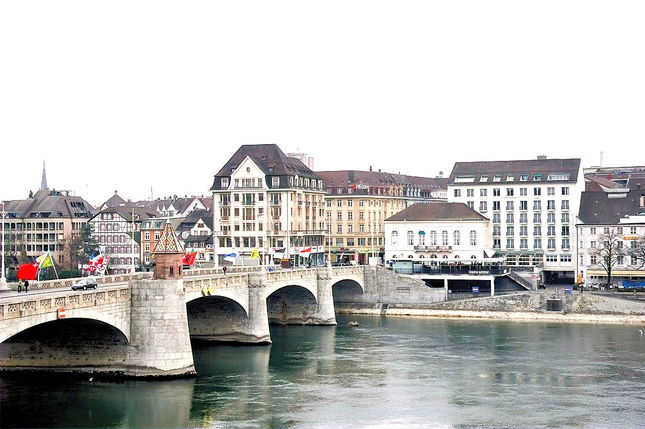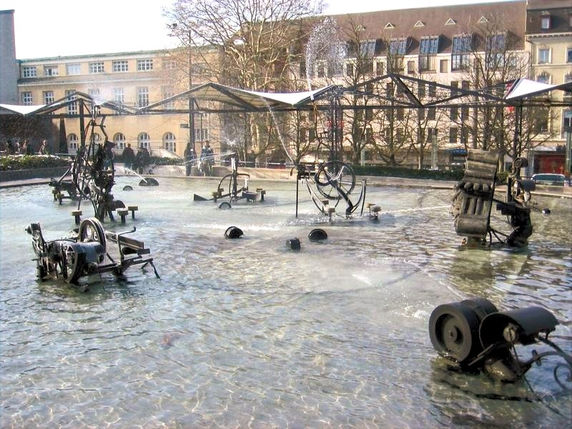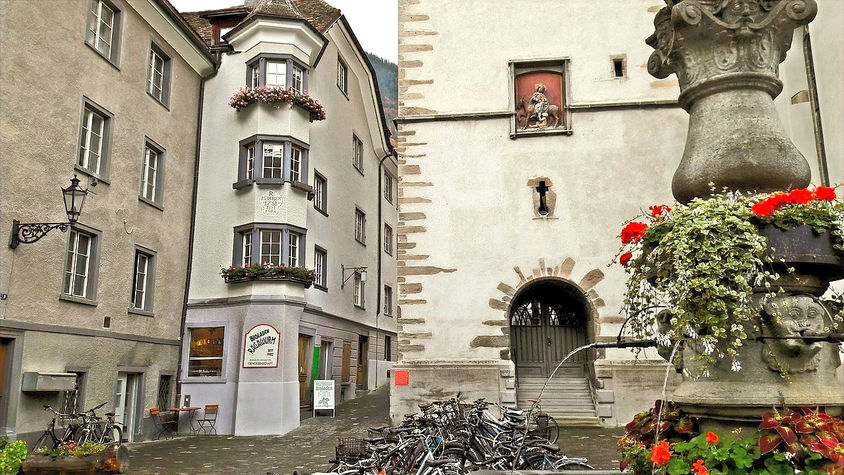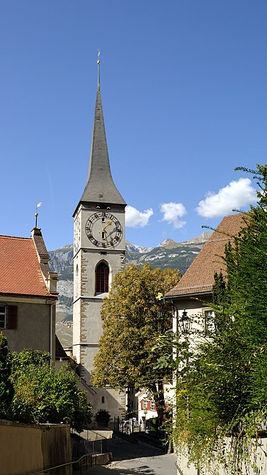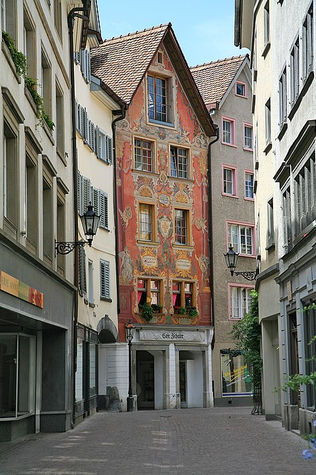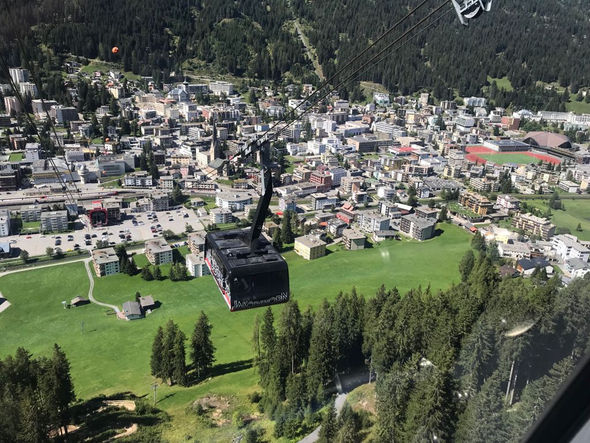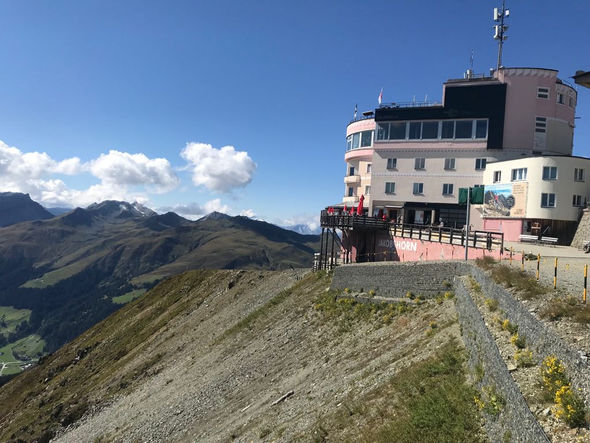
Basel
Basel is nestled right on the Rhine river, at the tripoint where the Swiss, German and French borders meet. The official language of Basel is German. One of Switzerland's underrated tourist destinations, Basel has a beautiful medieval old town center, a vibrant Carnival, and Basel is known as Switzerland's most artsy city, and its top attractions include more than 40 museums, the Swiss city with the most museums.
Old Town
A typical pretty Swiss Old Town, captures visitors with its stone streets, medieval churches, beautifully maintained old houses, brightly painted fountains and the impressive fortified gate, Spalentor. Here, you can make your own paper at a water-powered mill from the 15th century, or step into a house where Erasmus, the Swiss theologian and humanist, would meet up with his friends 500 years ago.
The Spalentor
Basel was once defended by city walls, but these walls were torn down to allow Basel to grow in the 19th century. However, three gates remain, the most impressive of which is Spalentor dating from 1370.
The Spalentor is a fortified gate controlling the western approach to the city from France. Look to the left of the gate to find an early 19th-century letterbox with the emblem of the Basel pigeon framed by two lions.
Market Square (Marktplatz)
Colorful daily market, this is a great place to stop for a snack or just to check out the amazingly fresh local produce, from freshly baked bread, cheese to beautiful bouquets of flower.
Rathaus
Dominating the Market Square is the bright red Basel Rathaus, with its colorful painted façade in Late Burgundian Gothic style dating from 1504 to 1521. Standing in the courtyard is the statue of Munatius Plancus, Roman founder of the town.
Tinguely Fountain
In 1977, Swiss artist Jean Tinguely created sculptural machines in a shallow fountain, and in the process gifted Basel a famous new landmark.
Basel's Minster
Set atop the highest point on Münsterhügel (Minster Hill), Basel's Minster is easily spotted by its prominent spires and brightly patterned roof tiles, standing in the elegant 18th-century Minster Square (Münsterplatz), formerly the site of a Roman fort. The minster was rebuilt in Gothic style after an earthquake in 1356.
Museums
If you’re a museum lover, you’ll be completely in your element in Basel, as the city is well known for its museums.. Some major museums include the Kunstmuseum (Museum of Fine Arts), replete with Renaissance, Baroque and modern art; the Natural History Museum; Paper Mill Museum; Spielzeug Welten Museum,a toy museum with a large collection of teddy bears and a Cartoon museum. If science is more your thing, you can visit the Pharmazie-Hostorisches Museum (Museum of Pharmacy), set in what once was the home of a famous alchemist.
Chur
Oldest town of Switzerland, charms visitors with its fine mountain setting, twisting alleys, pretty little squares, brightly plastered buildings and the peaceful atmosphere in the traffic-free Old Town.
One of the most fascinating aspects of this Swiss town is that the common language is Romansh, which descended from the spoken Latin of the Roman Empire. This mountainous region was colonized by the Romans way back in 15 BC and yet the language remains.
Today, Chur is an important commercial center, the gateway to the Grisons mountains and many resorts, with the Bernina Express and the Glacier Express trains running regularly.
Davos
An Alpine resort town in the canton of Graubünden, is located on the river Landwasser, in the Rhaetian Alps, between the Plessur and Albula Ranges.
Davos is best known today for hosting the World Economic Forum, an annual meeting of international politicians, financiers and corporate leaders. With a long history of winter sport, this holiday resort has one of Switzerland's largest ski resorts. Davos is the birthplace of the famous Hockey Club HCD. HC Davos plays in the National League. Their home arena is the Vaillant Arena. HC Davos is the record holder in the Spengler Cup and one of the most successful teams in Switzerland. Vaillant Arena in Davos is one of the most beautiful hockey stadiums in the world. It is a good idea to visit the Vaillant Arena, enjoy a dinner there and watch HCD play.
In the centre of Davos, visitors will find excellent shopping, with numerous boutiques, cafés and restaurants. At night, too, there’s plenty of entertainment, with bars, discos and a casino.
Davos offers a wide variety of winter sports activities, and summer hiking trails, set amid stunning Alpine scenery. There are six main ski areas in winter, with a total of 320 kilometres of slopes. The six ski areas Parsenn/Gotschna, Jakobshorn, Pischa, Madrisa, Rinerhorn and Schatzalp/Strela have been brought together into one vast winter sports arena. Besides skiing, Davos has the largest natural ice skating field in Europe.
St. Moritz
Switzerland's original winter wonderland and the birthplace of Alpine winter tourism, St Moritz has been luring royals and celebrities since 1864 and has twice hosted the Winter Olympics.
Renowned for its Winter White Turf, a unique, exclusive top-class event with exciting horse-racing on the frozen lake, that took place during winter.
During the winter the lake freezes completely, ready for winter sports. In autumn, many people come to admire the colorful foliage. Scented flowers offer wonderful blooming in the spring and summer is perfect for water sport. St. Moritz welcomes you every season!






